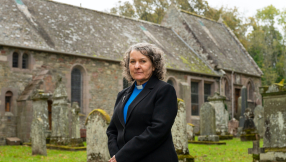One of the most controversial cults that have emerged in recent times is Scientology. Its name is a misnomer as it suggests that its doctrines are based on scientific principles. Most of its followers have been lured into this idea but a quick glance at its basic teachings would reveal that the movement adheres to pseudoscience.
The entrance of the European Office for Public Affairs and Human Rights of the Church of Scientology is pictured in Brussels, Belgium, March 11, 2016.
It is not difficult to draw this conclusion especially when one discovers that its founder, Lafayette Ronald Hubbard, was a science-fiction writer. Most of its doctrine comes from his teachings that have no scientific or historical basis. Hubbard died in 1986 and left the church operation to his assistant, David Miscavige.
Scientology is the combination of the Latin word "Scio" which means "knowing in the full sense of the word" and the Greek word "logos" meaning "study of." Put together, the movement would mean "knowing how to know." Its beliefs are said to come from "all great religions" as early as 50,000 years ago.
Scientology teaches about a hierarchy of gods that are more powerful one after the other. Followers believe in Jesus but not His divinity. They recognize a spiritual being called "Thetan," which means "the source of all life or life itself." Its appeal lies on the promise of giving supernatural abilities to its adherents.
Scientology teaches about "past lives" and believes in reincarnation. This cycle of constant reincarnation goes on until the spirit attains perfection wherein the "aberrations" of the past lives are removed. Once achieved, the spirit graduates to heaven. One means to attain this is a process called "auditing" which costs hundreds of thousands of dollars.
There have been accusations that Scientology is just a money-making racket. In the financial policy of the church, Hubbard apparently wrote: "MAKE MONEY, MAKE MORE MONEY, MAKE OTHERS PRODUCE SO AS TO MAKE MONEY." Its members are also made to sign "a one-billion-year pledge to symbolize their eternal commitment to the religion."













